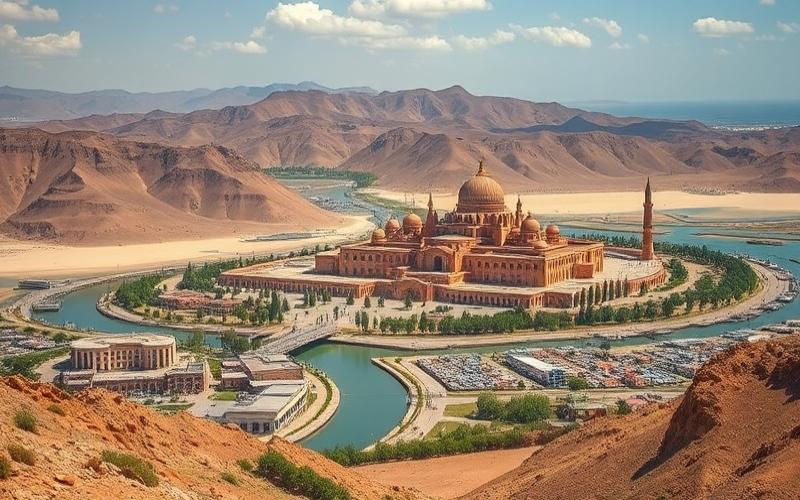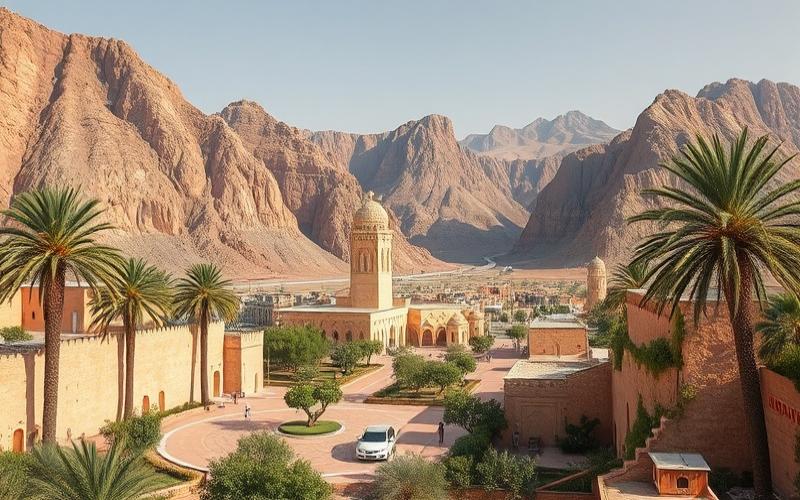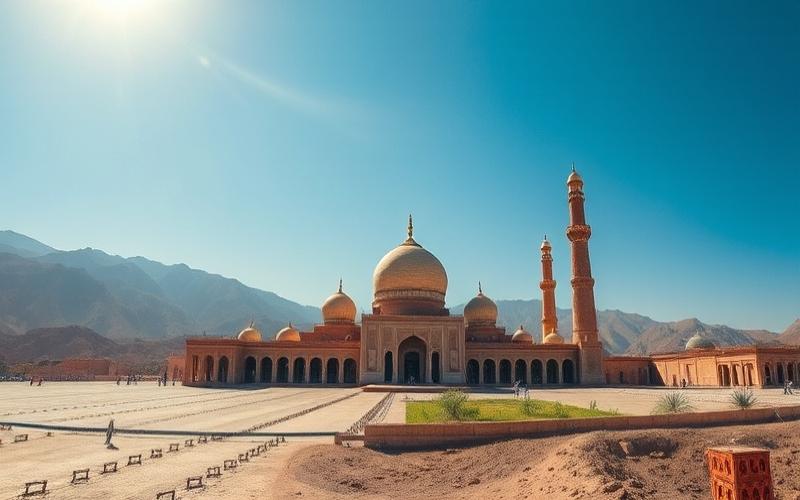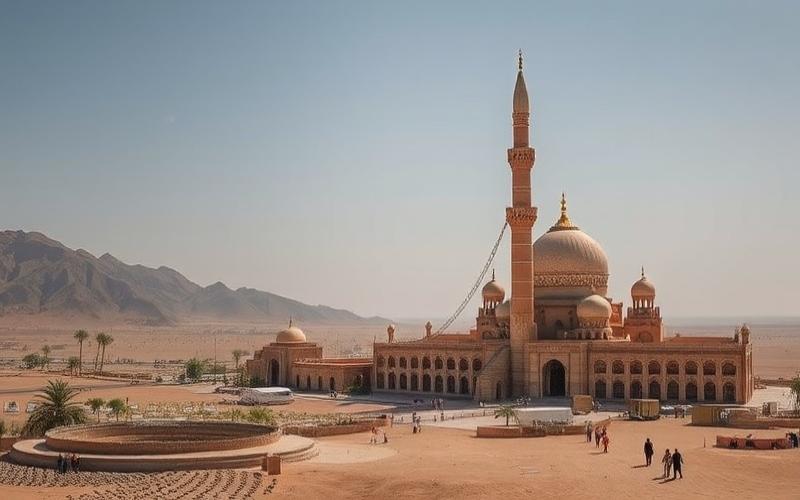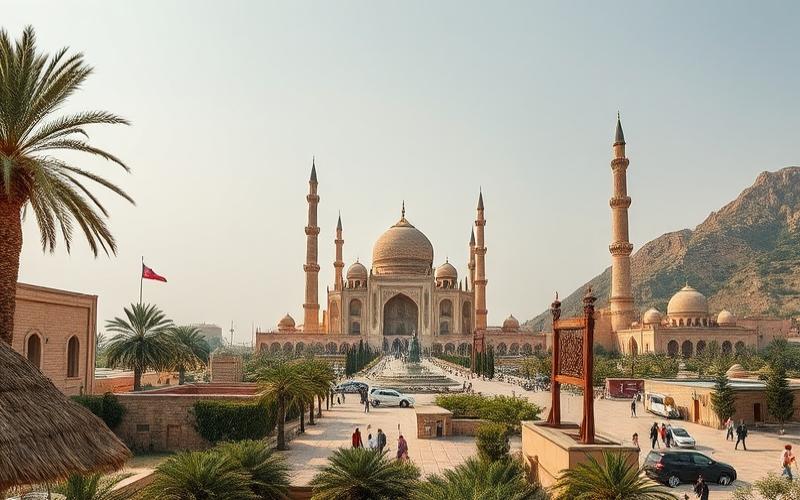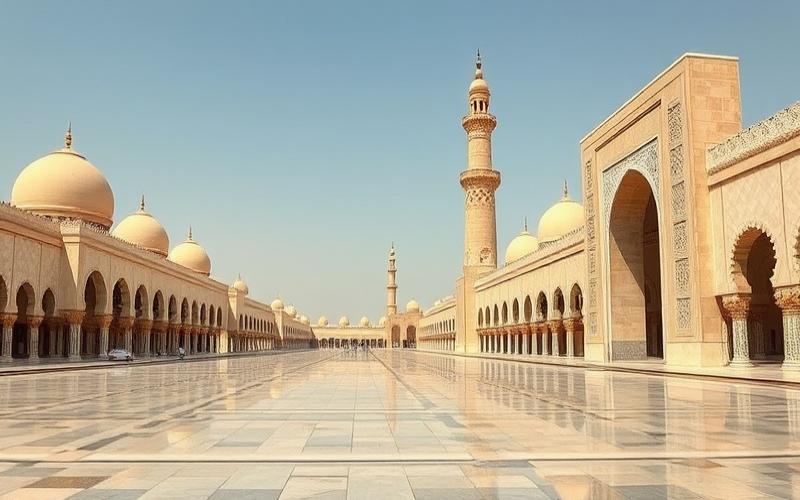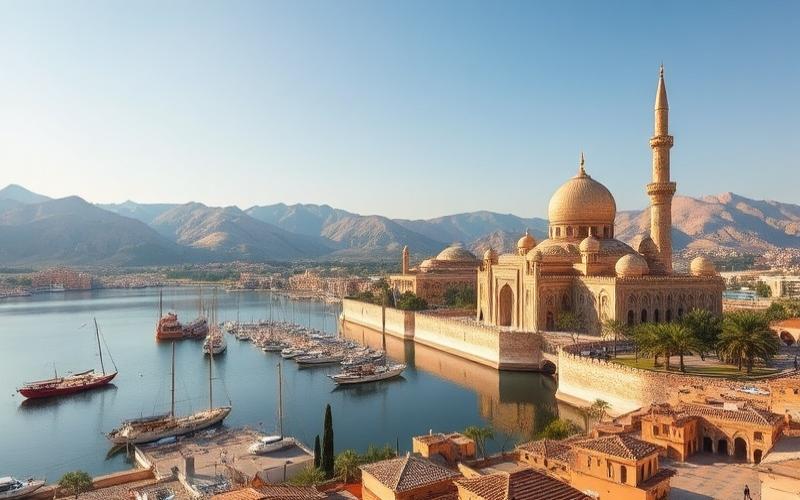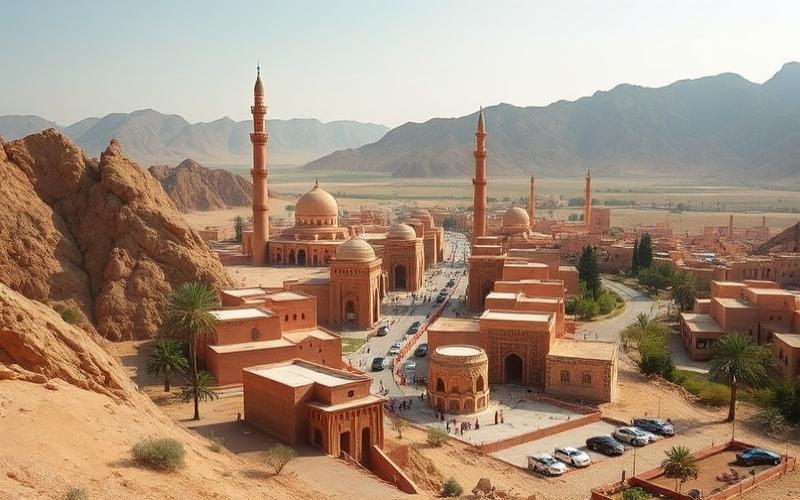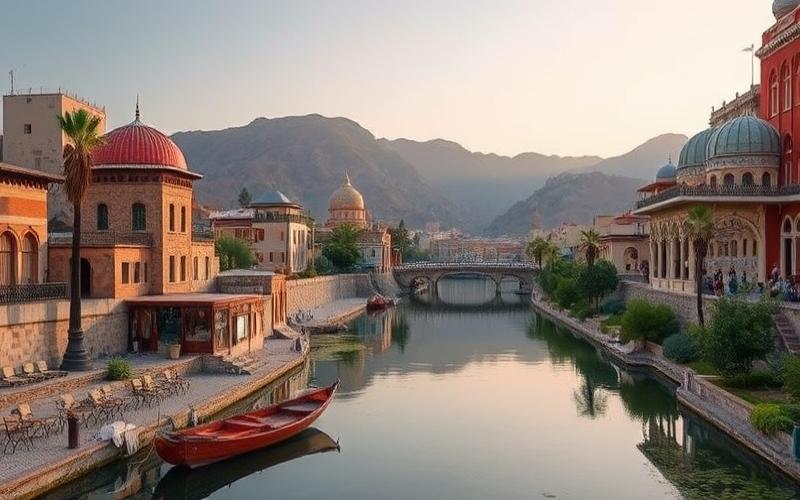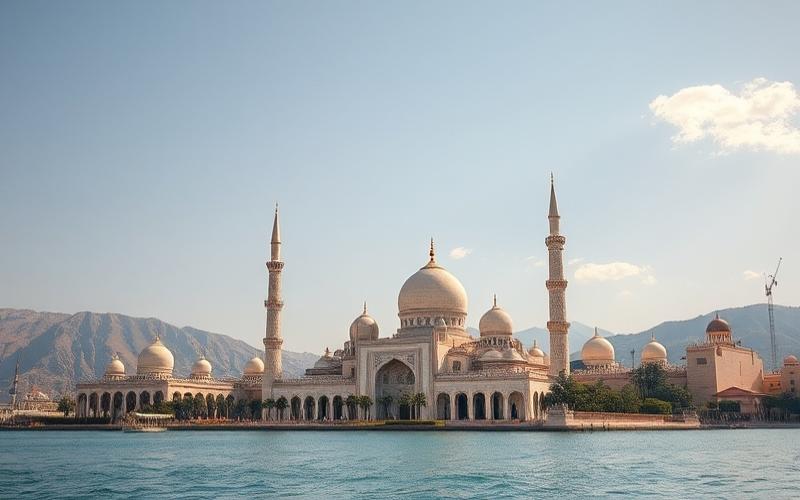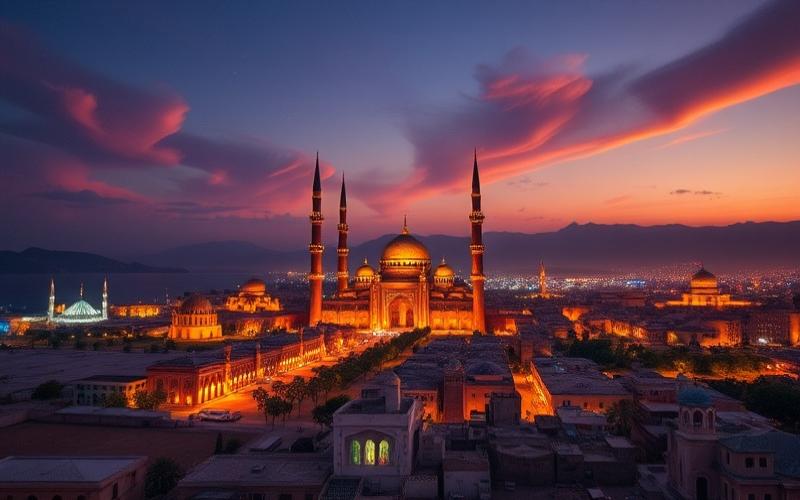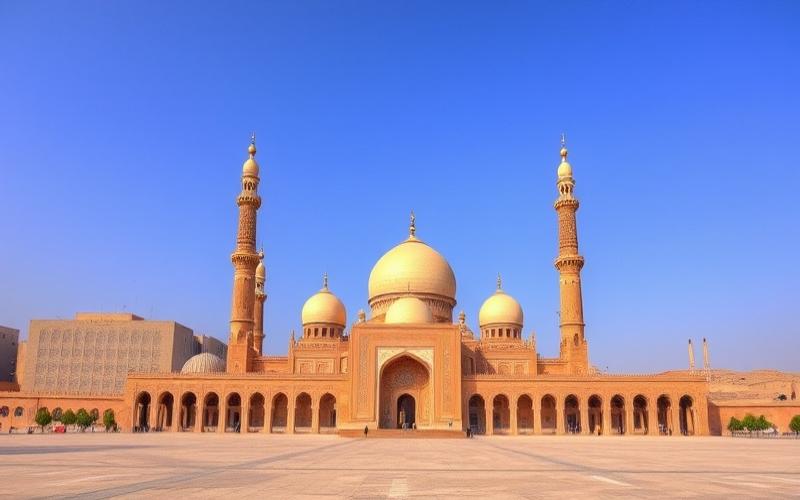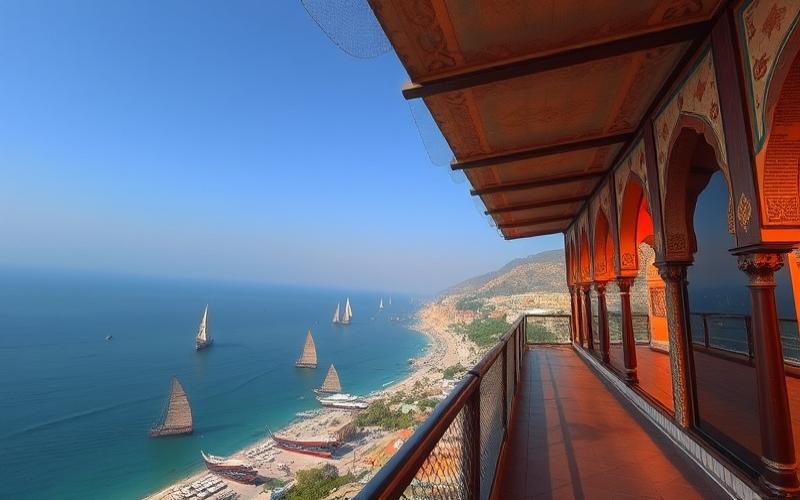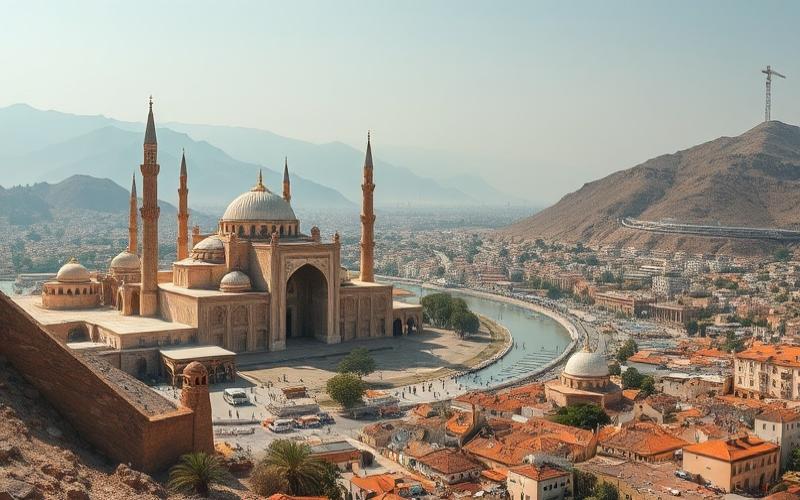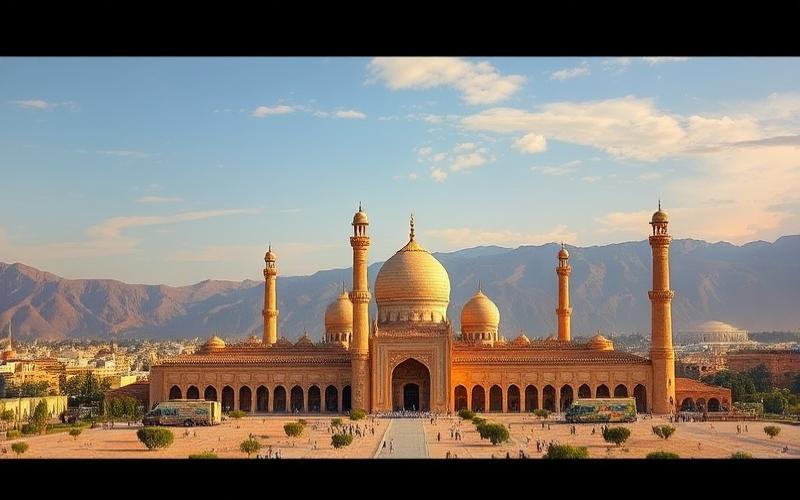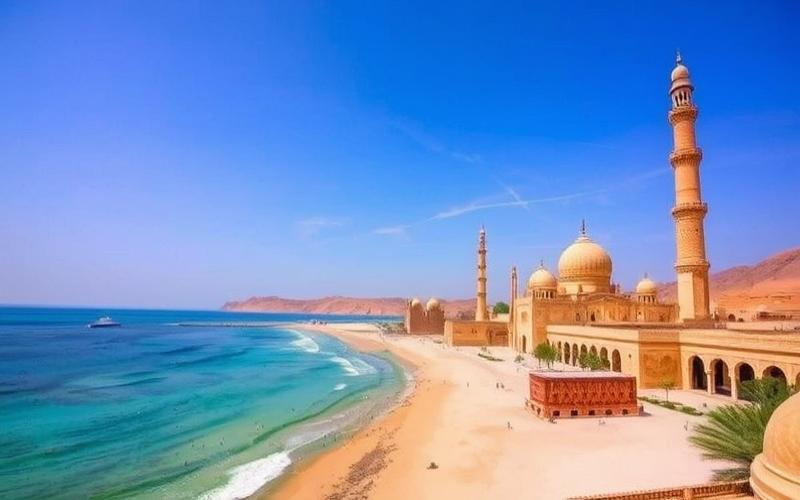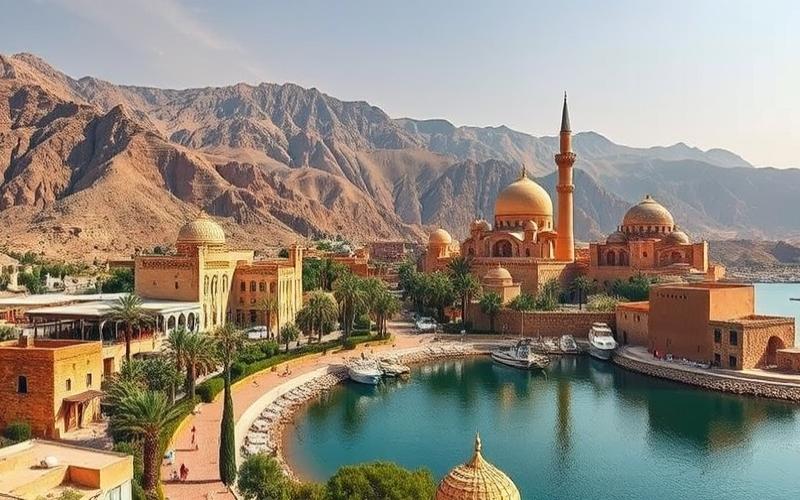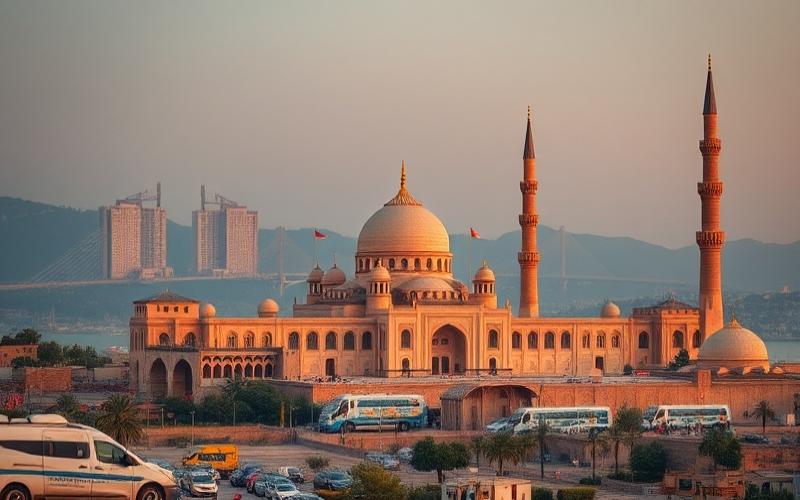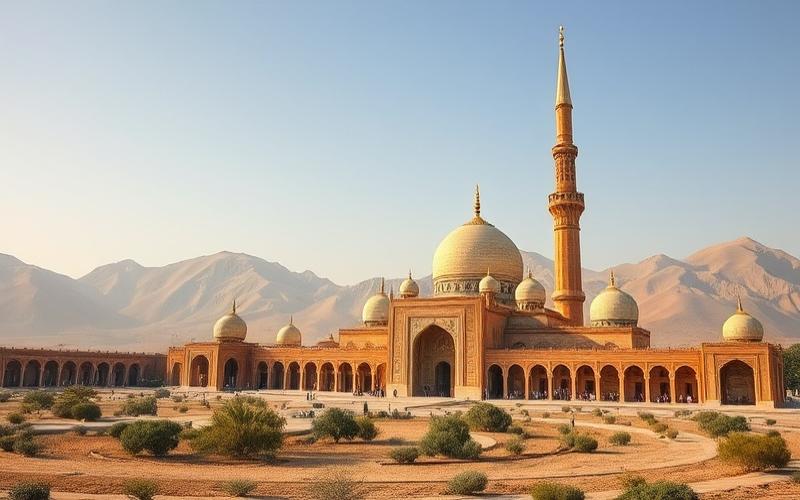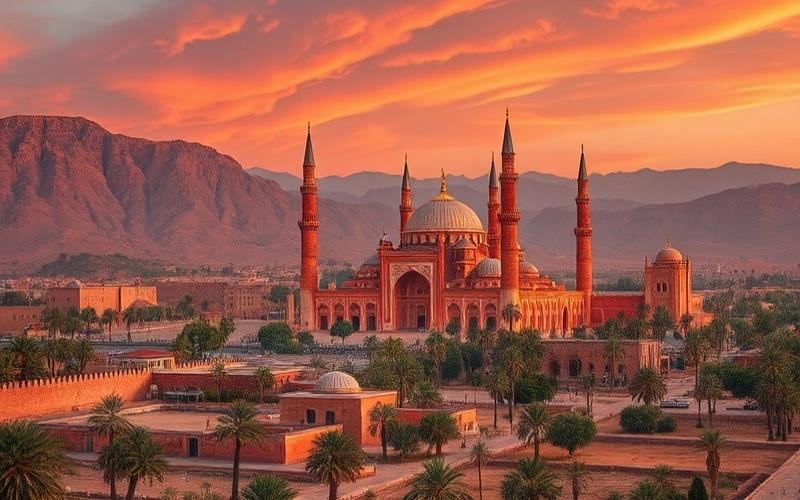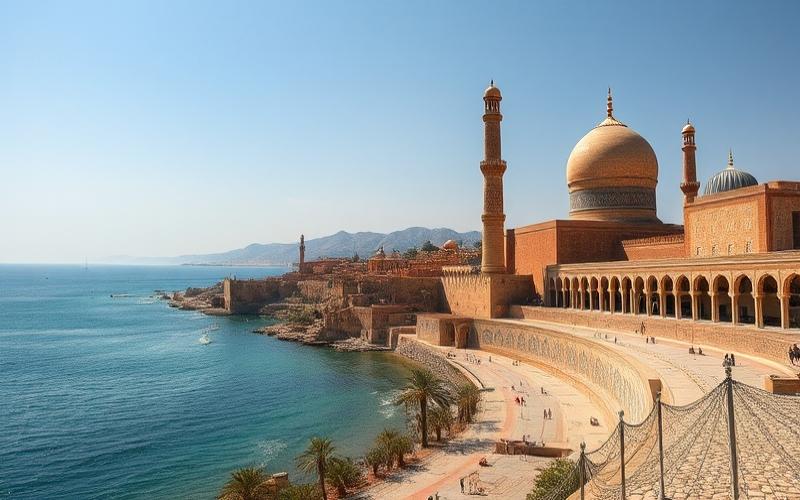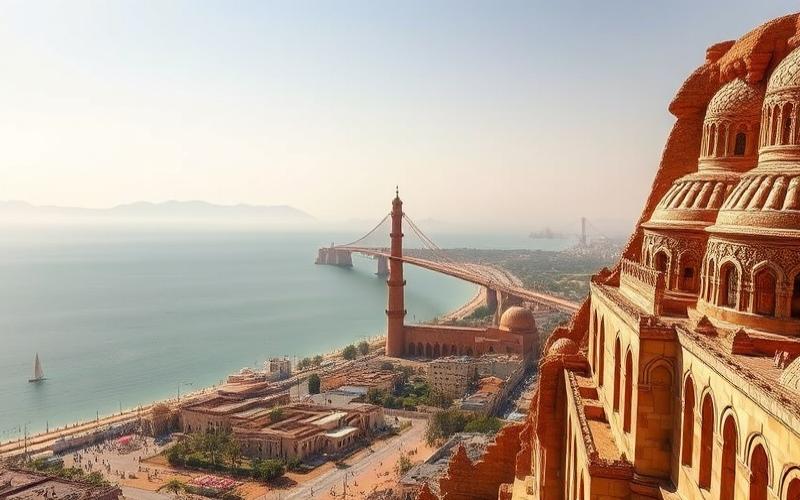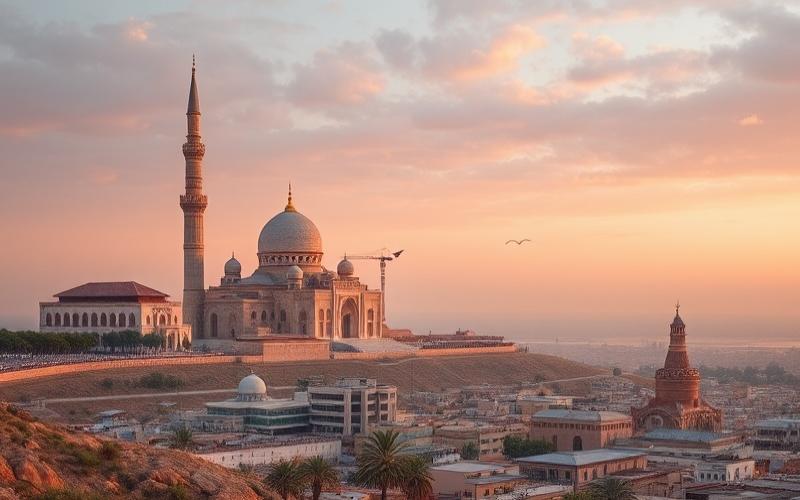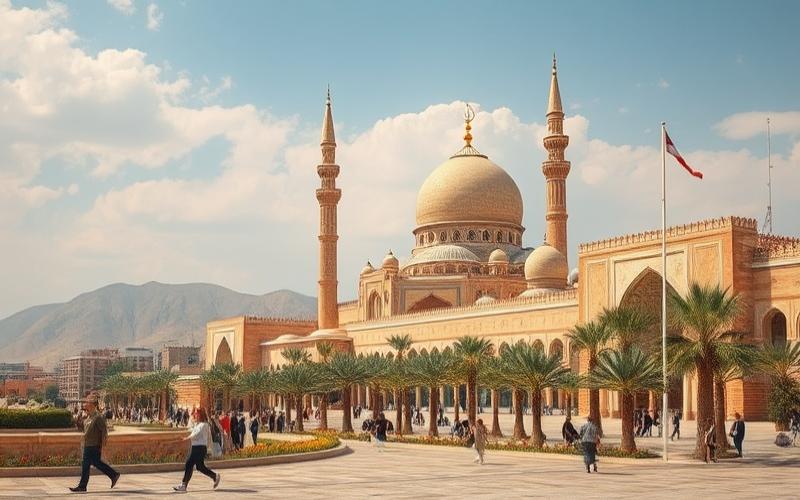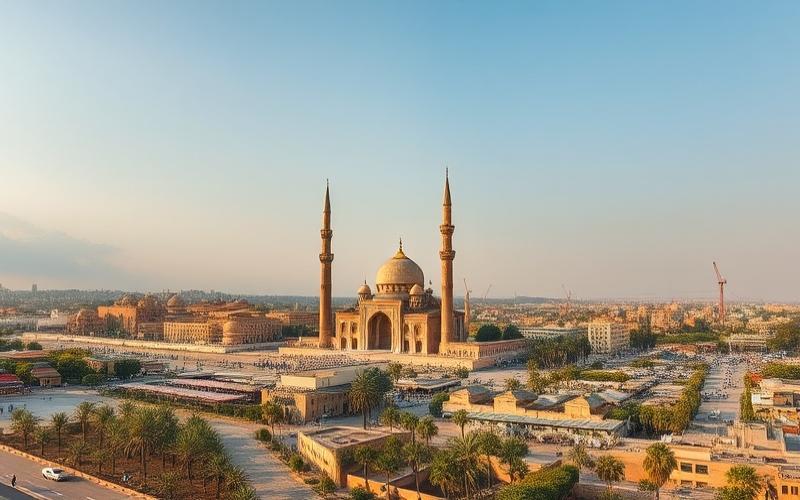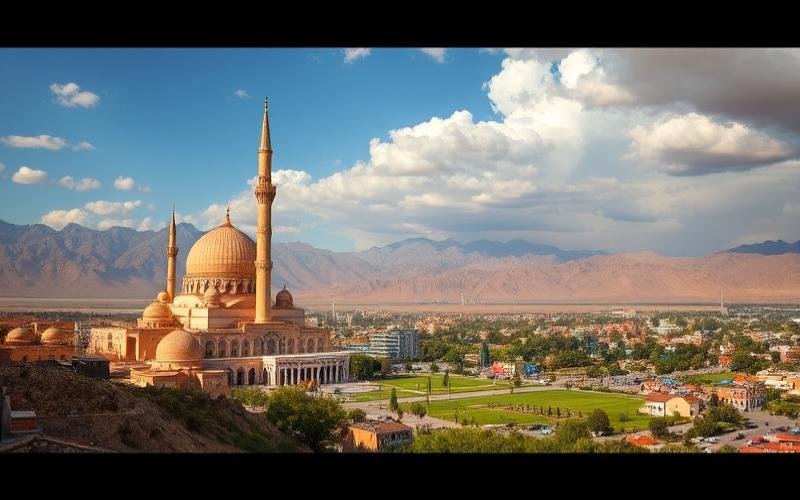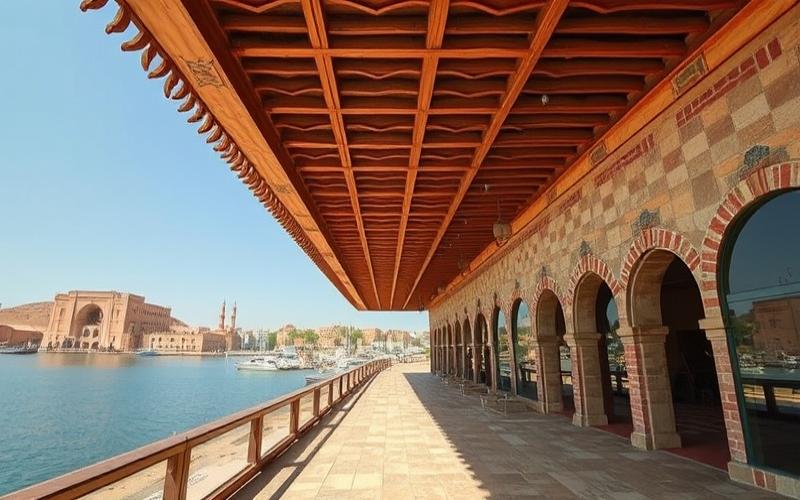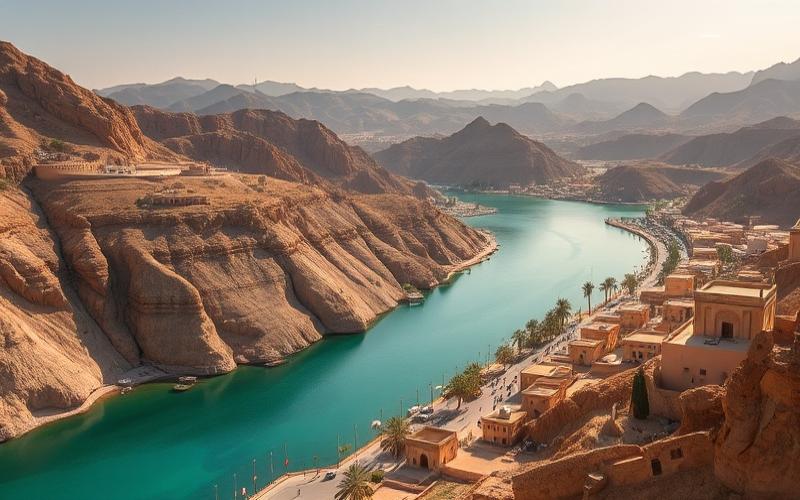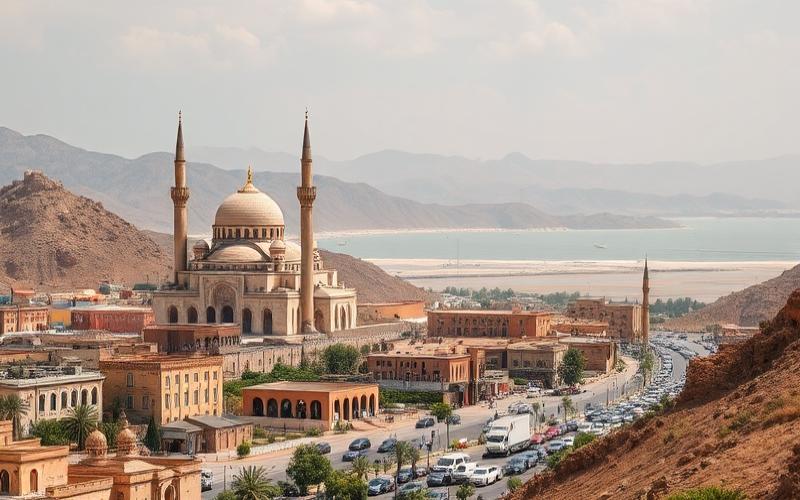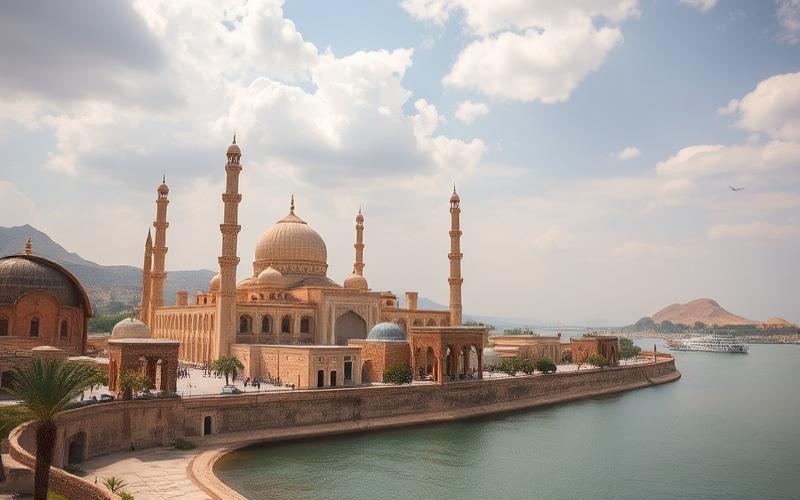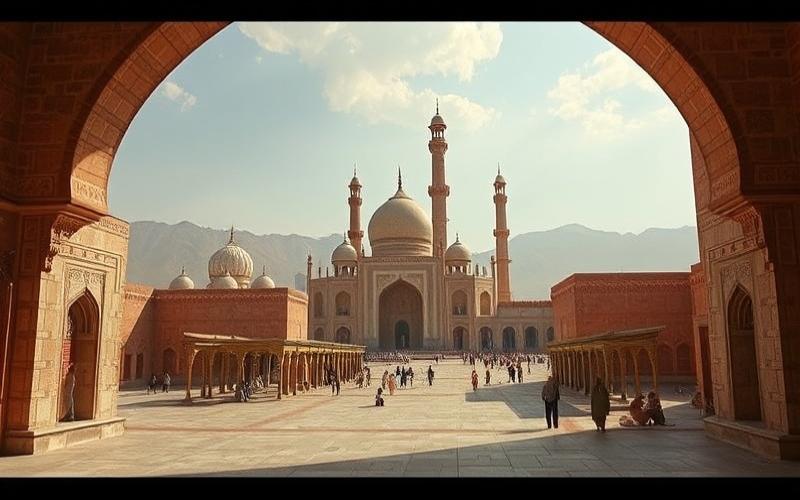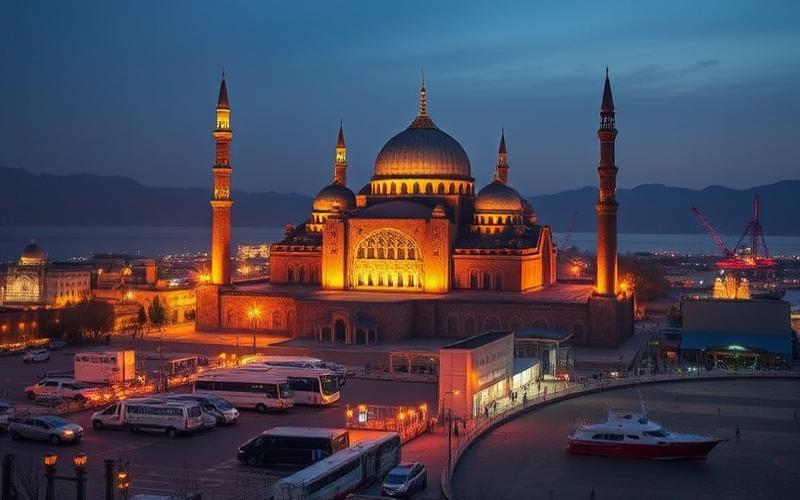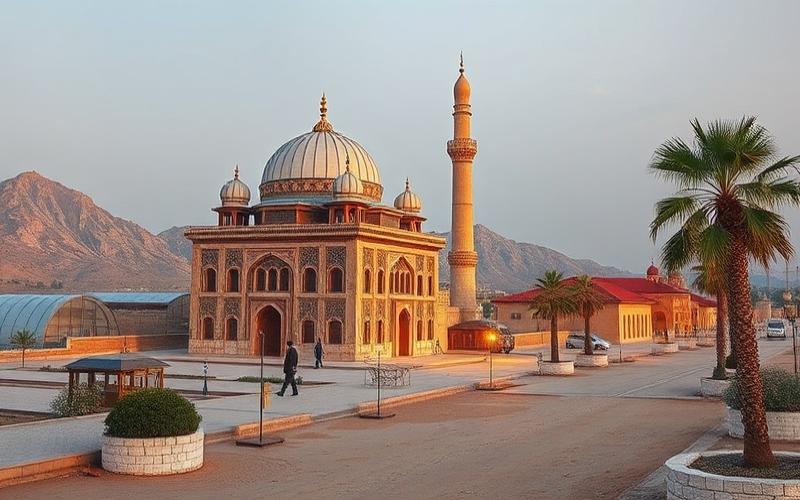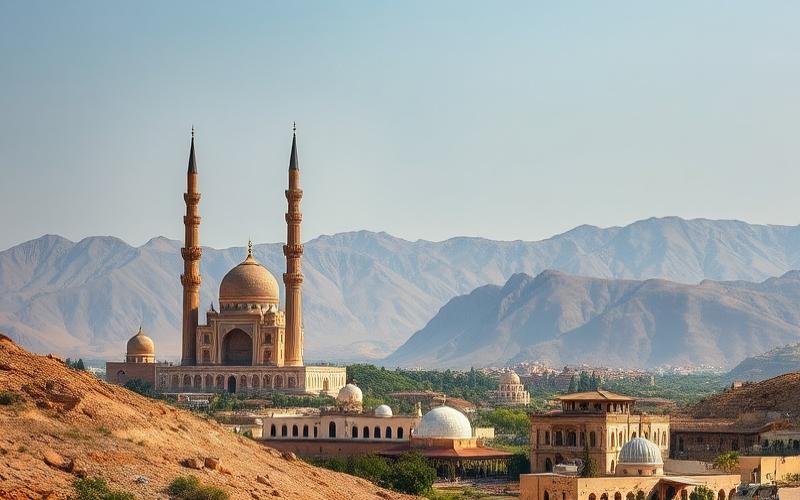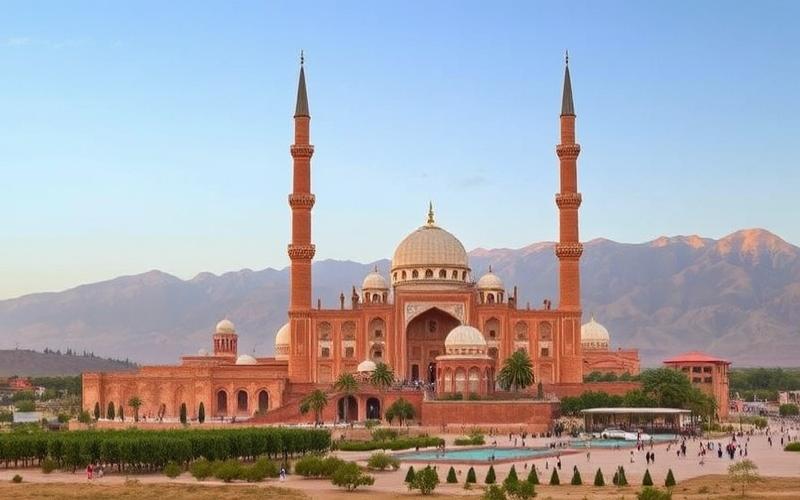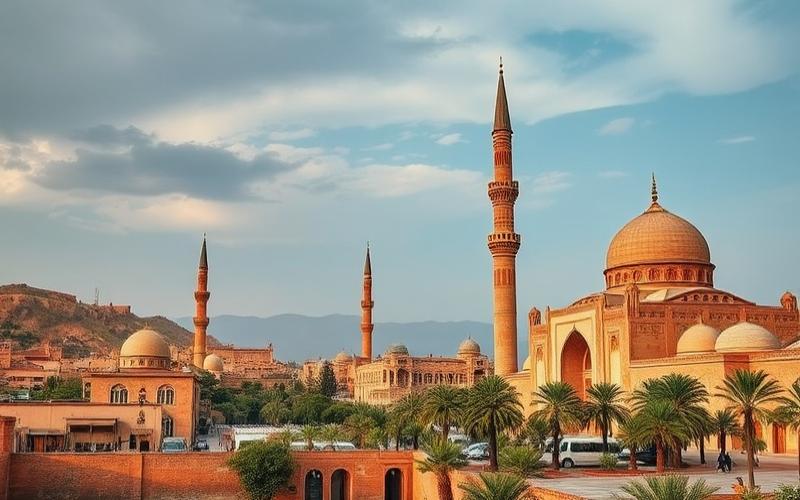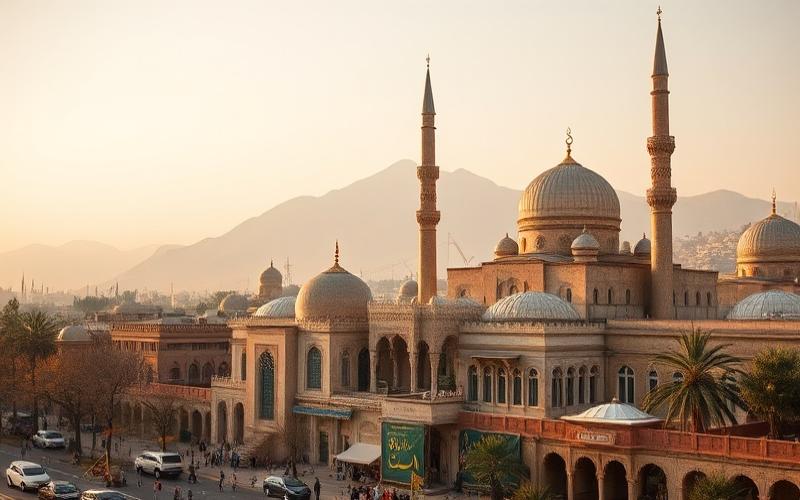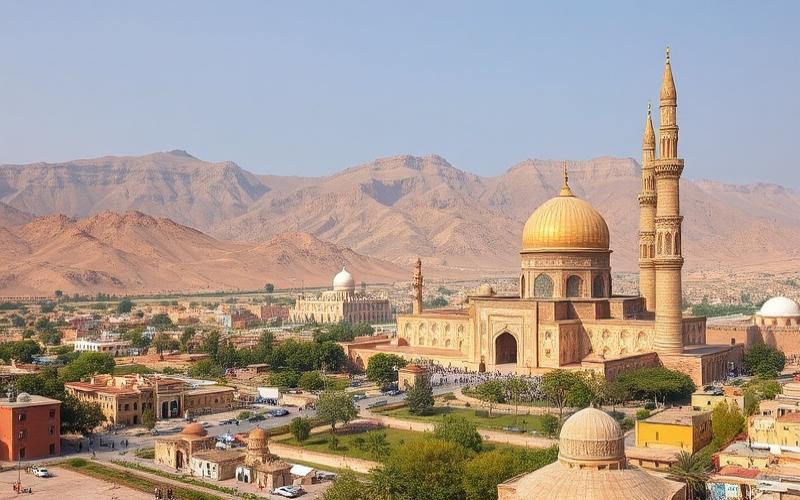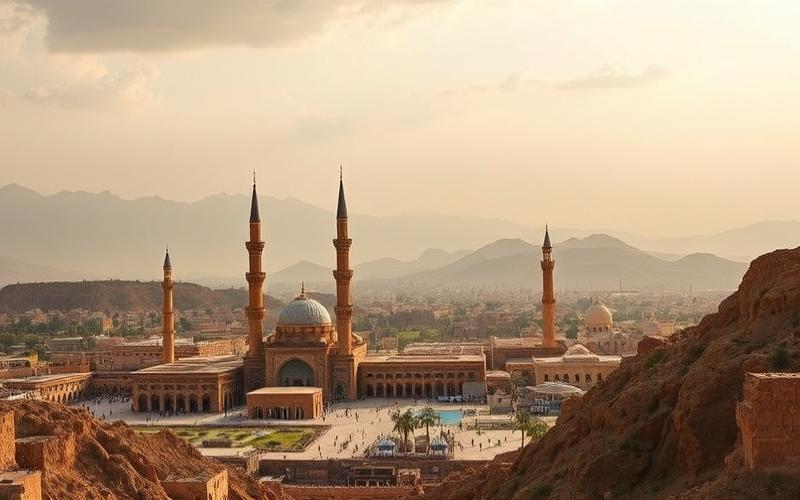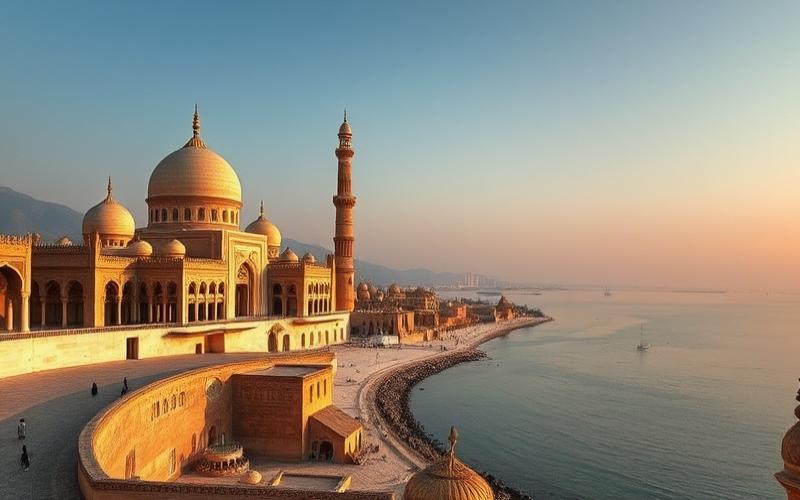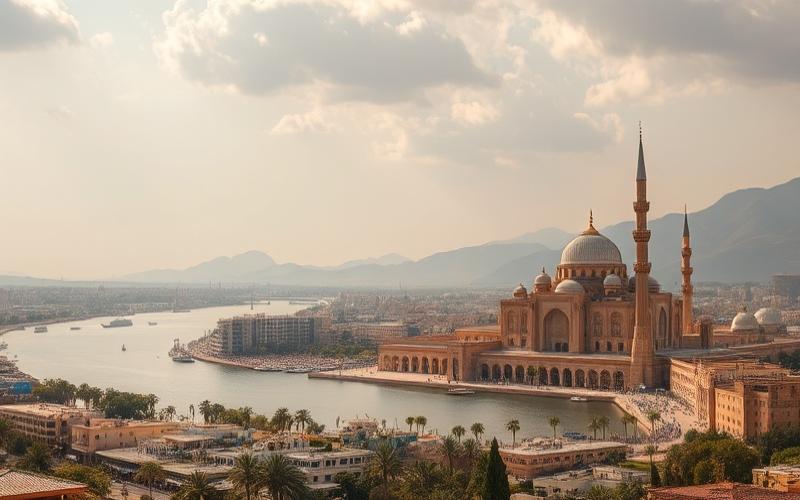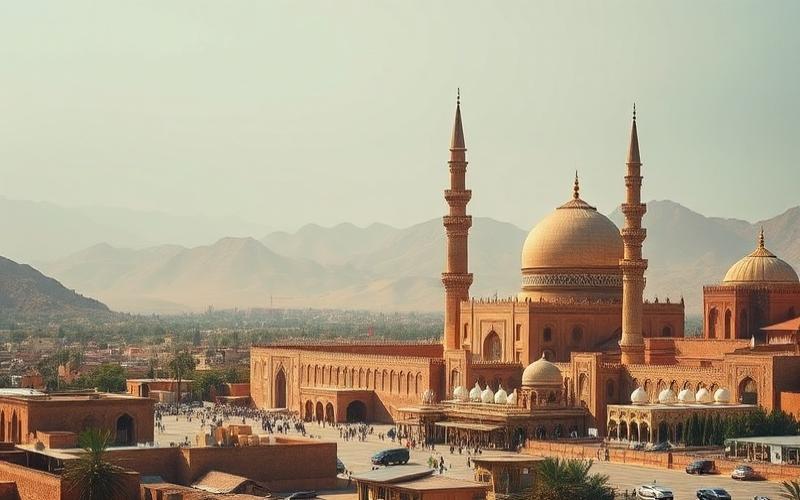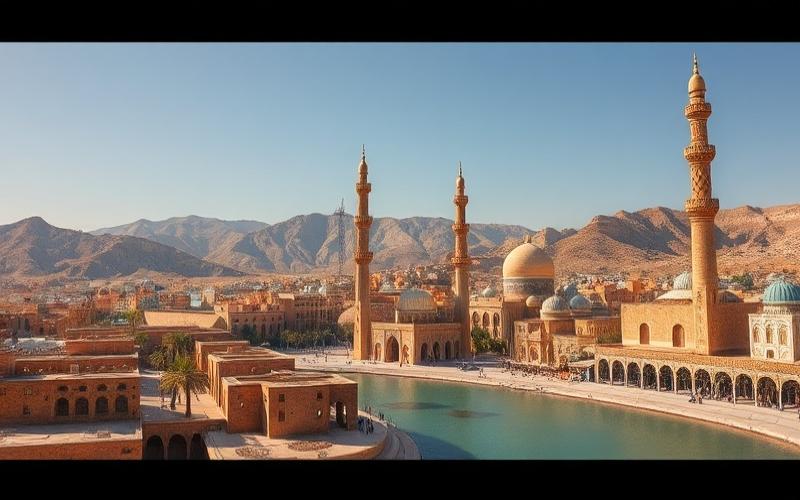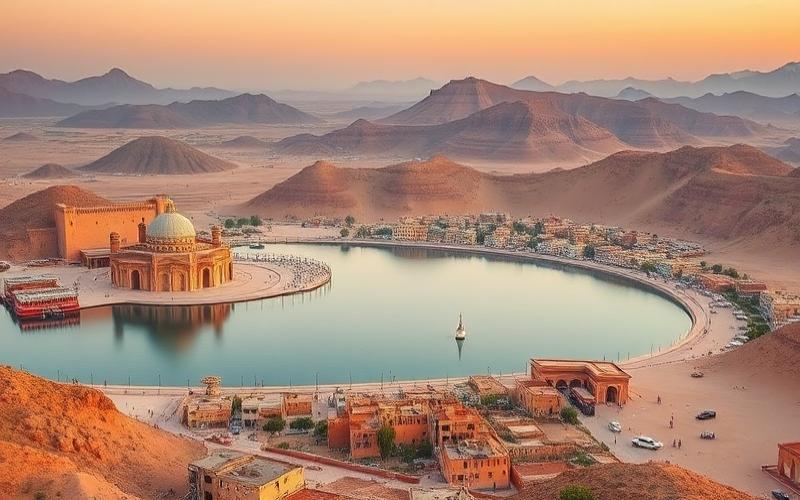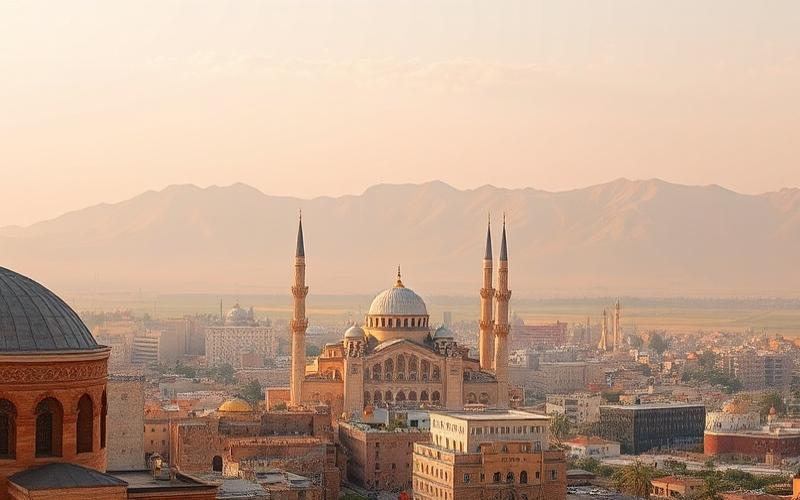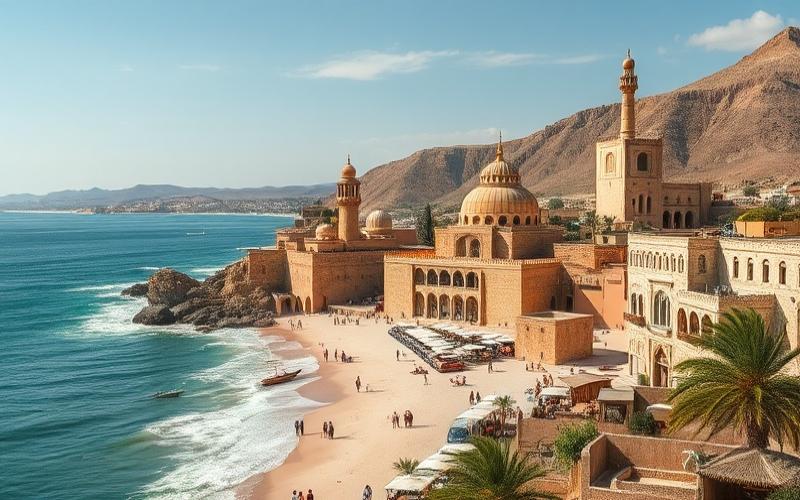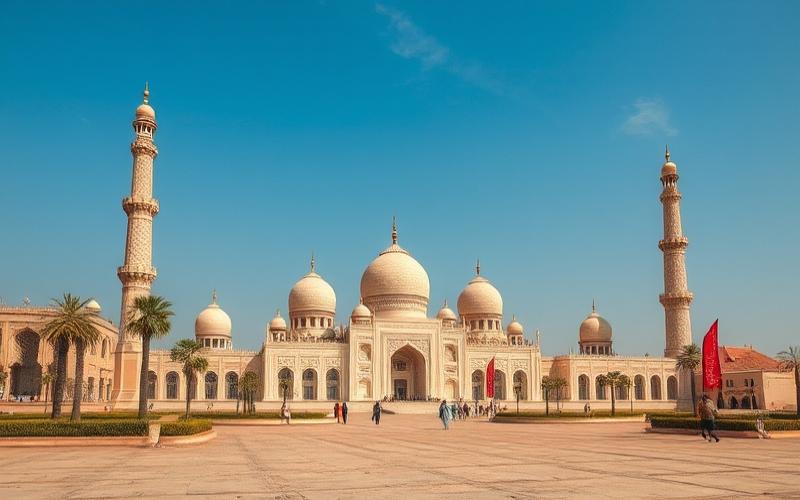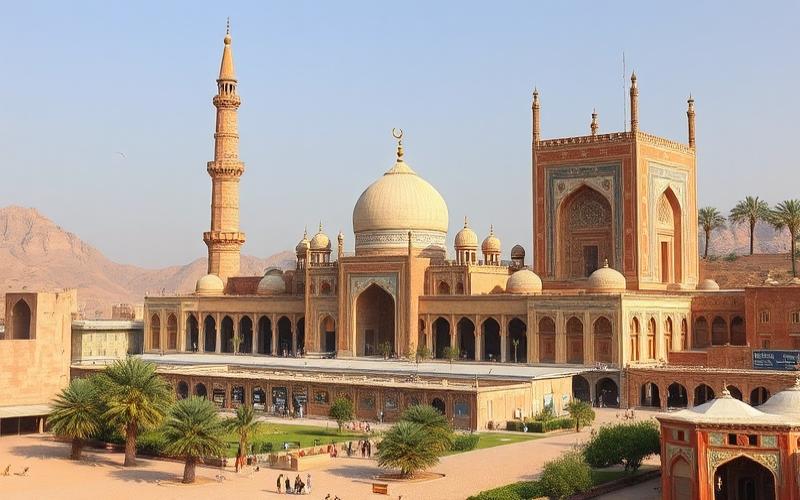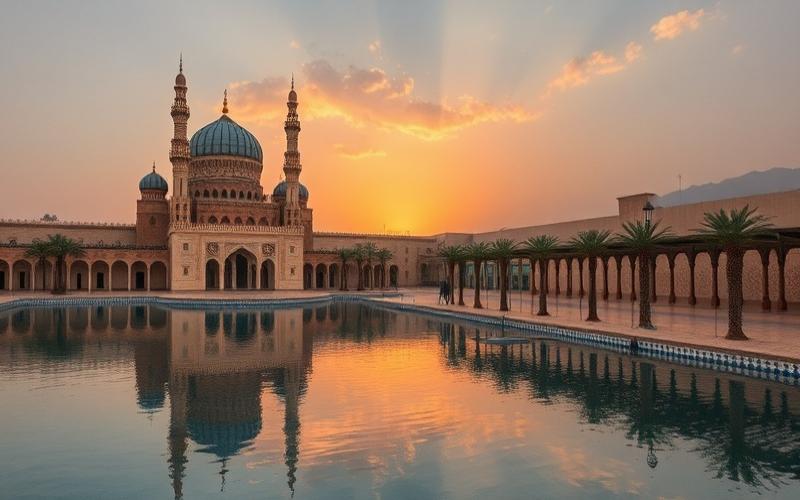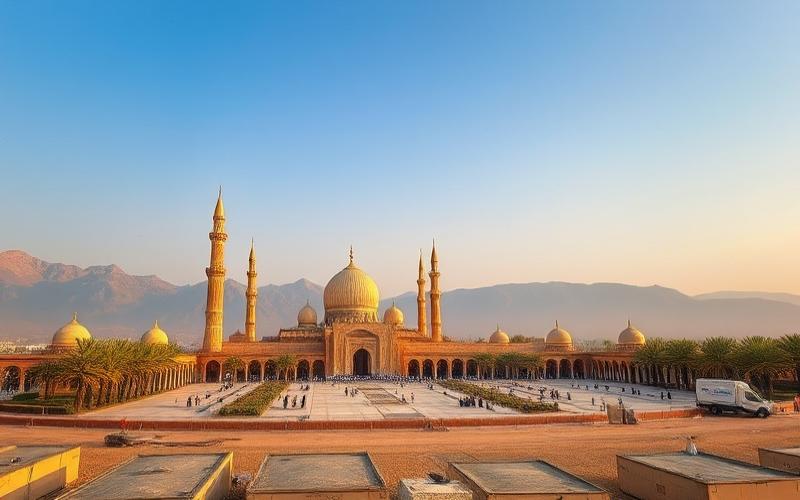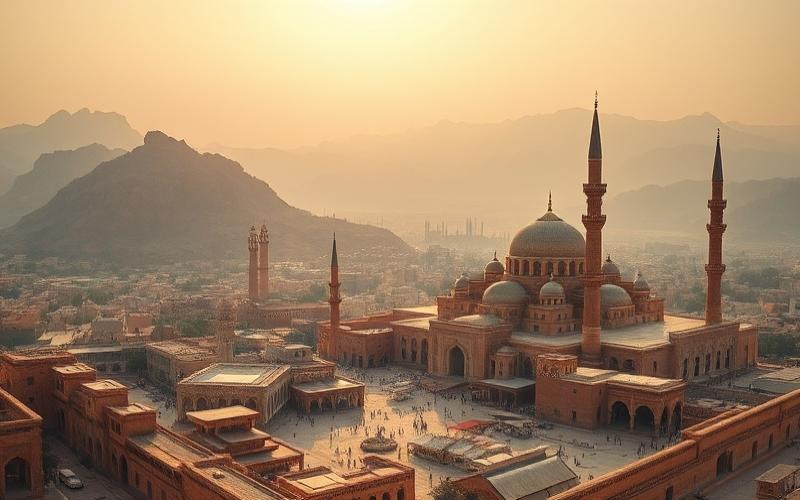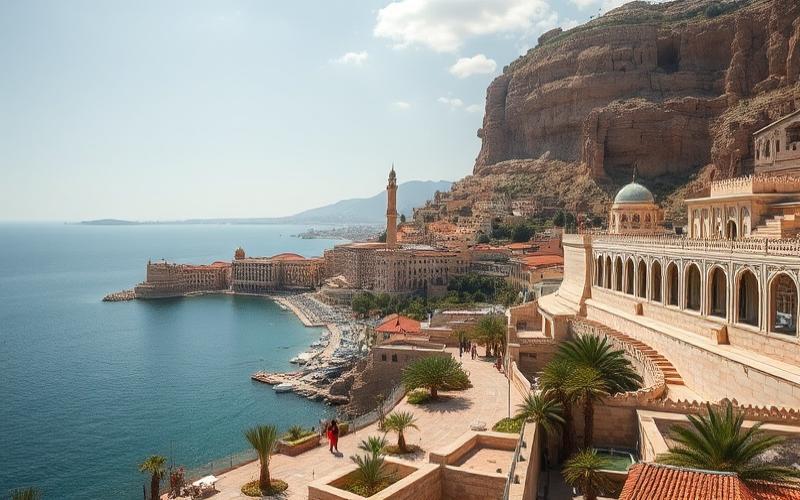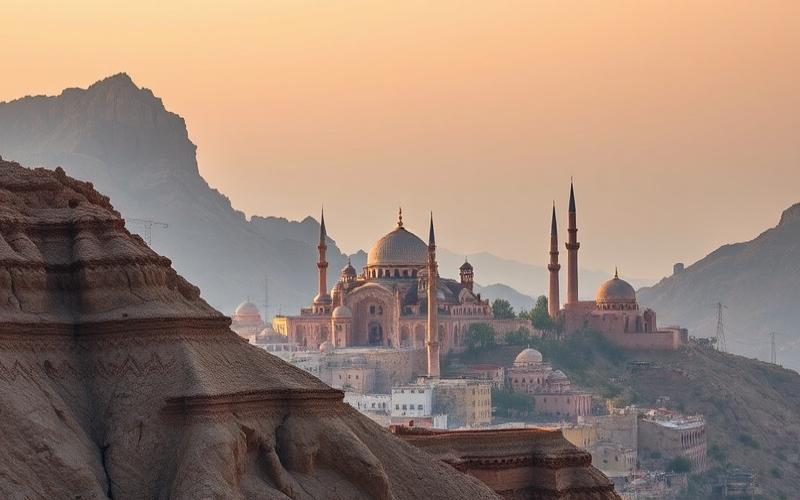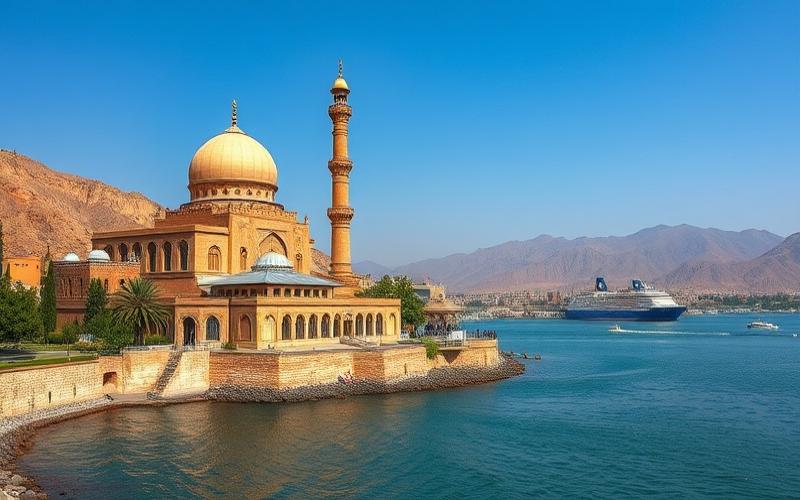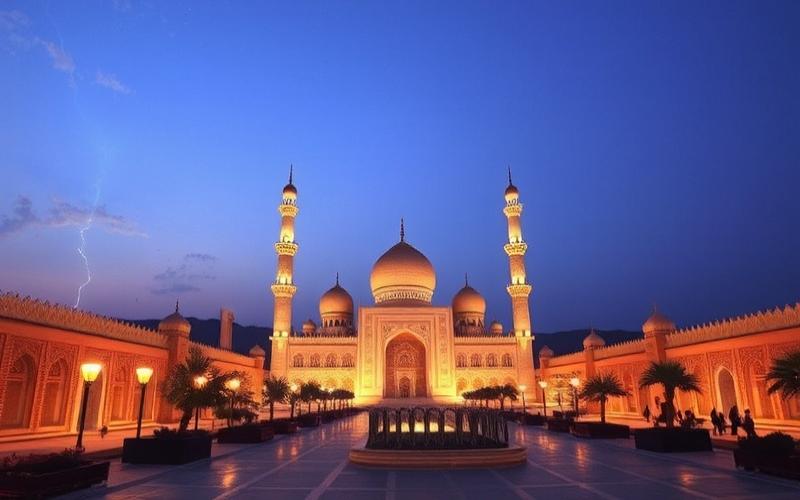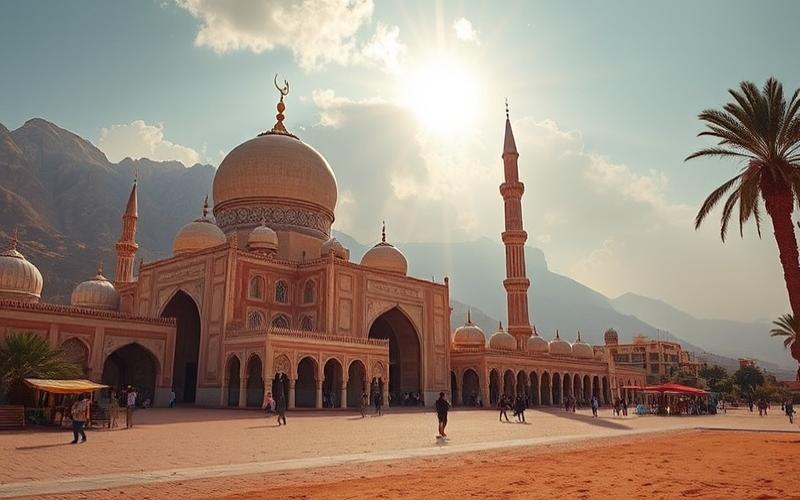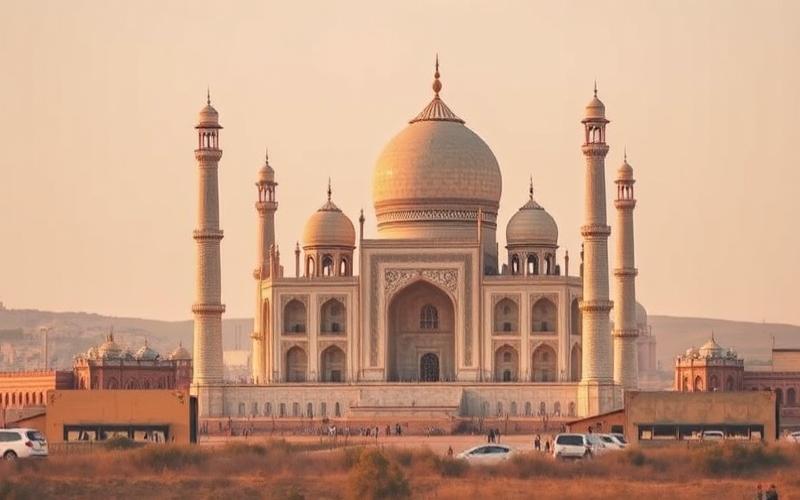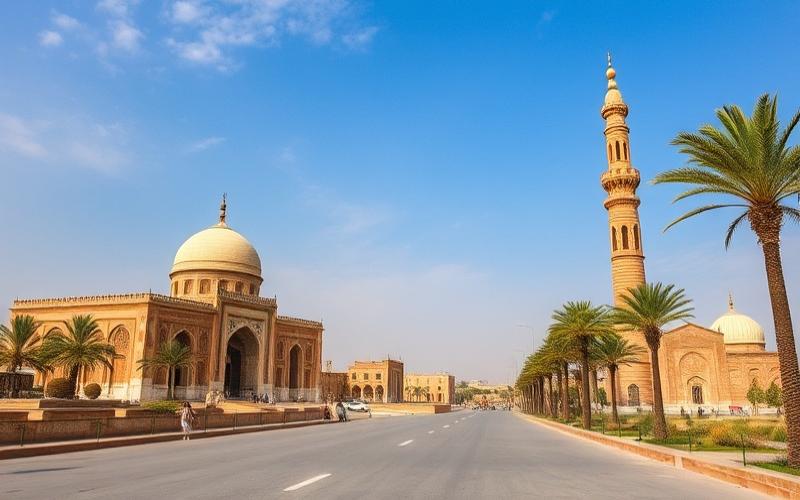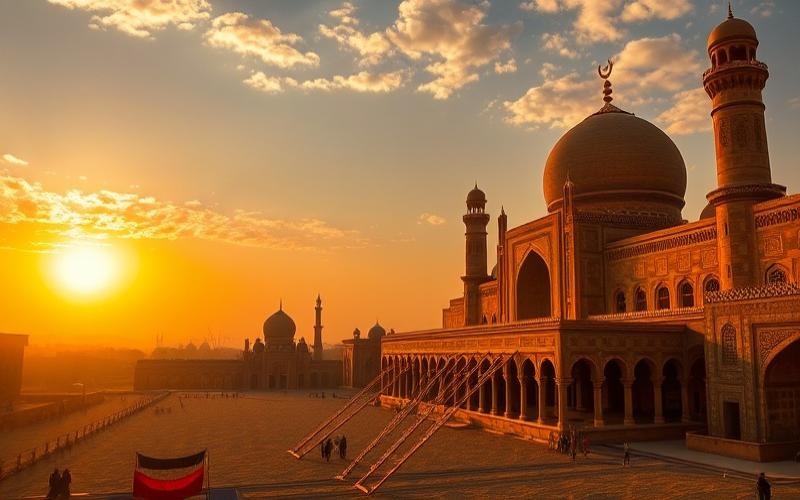
 Published on and written by Cyril Jarnias
Published on and written by Cyril Jarnias
Bahrain, an archipelago in the Persian Gulf, stands out for its cultural and religious richness, offering a fascinating glimpse into the region’s spiritual diversity. At the crossroads of worlds, this small kingdom is a true melting pot of civilizations where numerous religious communities coexist, each with its own rituals and places of worship.
From the majestic Al-Fateh Grand Mosque, capable of accommodating up to seven thousand worshippers, to Christian churches reflecting an active minority, along with Hindu temples and Jewish synagogues, Bahrain perfectly illustrates the peaceful coexistence and interfaith dialogue that prevail here.
This spiritual mosaic is evident not only in the country’s sacred architecture but also through festivals and celebrations that punctuate daily life, showcasing the tolerance and openness that characterize this island kingdom.
By exploring iconic places of worship and meeting the diverse communities that shape Bahrain’s religious and cultural identity, one discovers a microcosm where tradition and modernity live in harmony.
Religious Landscape in Bahrain
Bahraini society is distinguished by a notable religious diversity, stemming from a historical mix of local and expatriate populations. Here is a detailed overview of the main religions present, their socio-cultural importance, and the coexistence dynamics shaping the national identity.
| Religion | % of Population (2025) | Socio-cultural and Historical Importance |
|---|---|---|
| Islam | 70-74% | Official religion, foundation of law and national values. Two main branches: Shia Islam (majority among native Bahrainis, Baharna & Ajam communities) and Sunni Islam (dominant in government spheres). Religious holidays structure the national calendar. |
| Christianity | 10-14% | Primarily practiced by expatriates from India, Philippines, or Western countries; historical presence of a native Bahraini Christian minority (notably Greek Orthodox). Contributes to cultural diversity through private schools, historic churches in Manama. |
| Hinduism | ~10% | Imported by the large Indian community; Hindu temples visible in Manama; essential role in the commercial and artisanal sectors since the 19th century. |
| Buddhism | ~2-2.5% | Mainly practiced by Asian immigrants; discreet but active places of worship within the South Asian diaspora. |
| Judaism | <0.1% | Historical presence of a small native Jewish community; symbol of religious tolerance in the Gulf. |
Main Places of Worship in Bahrain
The main places of worship in Bahrain reflect the country’s religious and cultural diversity, with each site playing an essential role in the life of local communities.
| Place of Worship | Religion | Capacity/Attendance | Historical/Cultural Importance | Notable Events |
|---|---|---|---|---|
| Al-Fatih Grand Mosque | Islam (Sunni) | 7,000 worshippers | Symbol of Islamic heritage, inaugurated in 1988, imposing architecture, giant fiberglass dome | Friday prayers, Ramadan, Eid celebrations |
| Al Khamis Mosque | Islam (Sunni) | Several hundred | One of the oldest mosques in the Gulf (7th century), double minaret, major historical site | Local pilgrimages, daily prayers |
| Sacred Heart Catholic Church | Christianity | Several thousand | First Catholic church in the Gulf (1939), center for the expatriate community | Masses, Christmas, Easter |
| Our Lady of Arabia Cathedral | Christianity | 2,300 worshippers | Largest Catholic cathedral in the Arabian Peninsula, inaugurated in 2021 | Masses, major Christian celebrations |
| Krishna Hindu Temple | Hinduism | Several hundred | One of the oldest Hindu temples in the Gulf, founded in the 19th century in Manama, center for the Indian community | Holi, Diwali, Hindu religious festivals |
| Manama Synagogue | Judaism | Very small community | Only synagogue in the Gulf, symbol of tolerance, recently restored | Shabbat services, Jewish holidays |
Details and Anecdotes:
Al-Fatih Grand Mosque
Located in Manama, it is open to non-Muslim visitors, making it a bridge between cultures. During tours, a guide explains:
“Here, every Friday, the mosque fills with families coming to pray together, a moment of sharing and reflection.”
During Ramadan and Eid, the mosque hosts thousands of worshippers for major prayers and organizes meal distributions for the community.
Al Khamis Mosque
This mosque, with its iconic twin minarets, is a historical landmark. A worshipper shares:
“Praying here means feeling the weight of history and the continuity of our faith through the centuries.”
Visitors marvel at the architectural remains and the spiritual atmosphere of the place.
Christian Churches
The Christian community, mostly composed of expatriates, gathers primarily at the Sacred Heart Church in Manama, where masses are held in multiple languages. At the recently inaugurated Our Lady of Arabia Cathedral, a worshipper explains:
“This cathedral is a haven of peace where Christians from across the region can practice their faith freely.”
Hindu Temples
The Krishna Temple in Manama is the center for major Hindu festivals like Diwali, where the Indian community gathers in large numbers. A participant recounts:
“During celebrations, the temple lights up with a thousand colors; it’s a moment of joy and unity.”
Manama Synagogue
Although the Jewish community is very small, the synagogue remains a strong symbol of religious coexistence. A community member testifies:
“Even in small numbers, we can practice our religion safely; that’s unique in the region.”
Events and Attendance
- Major mosques host the main collective prayers every Friday and during major Islamic holidays.
- Churches celebrate Christmas, Easter, and other Christian holidays with exceptional attendance, attracting worshippers from across the Gulf.
- Hindu temples regularly organize celebrations open to all, symbolizing the integration of the Indian community.
- The synagogue holds services during major Jewish holidays, sometimes with representatives from other faiths, illustrating religious tolerance in Bahrain.
Bahrain’s religious diversity is thus embodied in the harmonious coexistence of its mosques, churches, temples, and synagogue, true witnesses to the openness and mutual respect that characterize the kingdom.
Good to Know:
The Al-Fatih Grand Mosque, capable of accommodating up to 7,000 worshippers, is not only a major prayer site but also an iconic tourist attraction in Bahrain. Additionally, the St. Christopher’s Anglican Church and the historic Manama Synagogue, recently restored, illustrate the rich coexistence of beliefs; each year, festivals such as Diwali and Hanukkah attract many local and international participants.
Expatriate Religious Communities in Bahrain
Bahrain hosts a mosaic of expatriate religious communities that actively participate in the kingdom’s social and cultural life. Among the most notable groups are Christians, Hindus, Sikhs, as well as Buddhist and Jewish communities.
| Community | Main Origins | Places of Worship | Major Events |
|---|---|---|---|
| Christian | India, Philippines, Europe, Middle East (Iraq, Syria…) | Our Lady of Arabia Cathedral (Awali), Protestant and Orthodox churches in Manama and Riffa | Christmas, Easter, multilingual masses |
| Hindu | India | Historic Hindu temple in Manama | Diwali, Holi |
| Sikh | India | Gurdwara (Sikh prayer place) | Vaisakhi |
| Buddhist | Sri Lanka, Thailand | Community centers | Vesak |
| Jewish | Various countries | Historic synagogue | Hanukkah |
Places of Worship
- The Our Lady of Arabia Catholic Cathedral is the largest church in the Arabian Peninsula; it illustrates the kingdom’s commitment to interfaith dialogue.
- Hindu temples are among the oldest non-Muslim sites in the Gulf.
- Gurdwaras allow Sikhs to organize their weekly prayers.
Social Integration
- Expatriates practice their faith freely in dedicated facilities.
- The Bahraini constitution guarantees legal protection for religious minorities; they can hold important positions in the economy or healthcare but not at the top of political power.
- Religious events are often open to the local public or lead to cultural collaborations. For example:
- During the Muslim Ramadan, it is not uncommon for Muslims and non-Muslims to share iftar in a spirit of national unity.
Multicultural Dynamics
Religious diversity is maintained by:
- An official climate of tolerance: allocation of land to build non-Islamic places of worship.
- Interfaith dialogue: regular visits between local and expatriate religious leaders; participation in each other’s festivals.
- Mutual respect during major national or religious celebrations (example: public guidelines during Ramadan).
“Here we can practice our faith without fear or constraint. Diversity is an integral part of daily life,” testifies an Indian Christian expatriate who has lived here for ten years.
Community Collaborations
- Interfaith forums organized by expatriate associations with official support
- Joint charitable actions during major holidays
- Educational projects promoting the country’s plural history
All this contributes to enriching a religious life marked by cultural exchange while respecting Bahrain’s Islamic legal framework.
Good to Know:
In Bahrain, expatriate religious communities, such as Christians, Hindus, and Sikhs, use various places of worship like churches and temples, while organizing cultural festivals like Diwali and Christmas, enriching the social fabric through intercommunity collaborations. Expatriates highlight the kingdom’s warm welcome and open-mindedness, facilitating the practice of their faith in this multicultural context.
Religious Options for Expatriates Living in Bahrain
Bahrain hosts a wide religious diversity among its expatriates, offering varied options for spiritual practice and community integration.
Main Religious Communities Present:
- Christians: Mostly expatriates from South Asia (India, Philippines, Sri Lanka), the Middle East (Lebanon, Syria, Egypt), Europe, and North America. A small minority of Bahraini Christians also exists.
- Hindus: Primarily Indian community, well-integrated into the expatriate fabric.
- Jews: Very small community, but Bahrain is the only Gulf country with a historic synagogue.
- Other Minorities: Buddhists, Sikhs, and other Asian groups are also present.
Main Accessible Places of Worship:
| Community | Places of Worship | Services in Foreign Languages |
|---|---|---|
| Catholics | Our Lady of Arabia Cathedral, Sacred Heart Church | English, Tagalog, Malayalam, Tamil, Hindi |
| Protestants | St. Christopher’s Anglican Church, Evangelical churches | English, sometimes other languages |
| Orthodox | Greek, Syriac, Coptic churches | Arabic, Greek, English, Syriac |
| Hindus | Hindu Temple in Manama | Hindi, English |
| Jews | Manama Synagogue | English, Hebrew |
- Churches and temples often hold multiple services weekly in different languages to accommodate non-Arabic speaking expatriates.
- The recently renovated synagogue hosts services for the Jewish community and visitors.
Accessible Religious Events and Festivals:
- Christians: Celebration of Christmas, Easter, saints’ feast days, often open to participation by all expatriates.
- Hindus: Festivals like Diwali, Holi, celebrated in temples and sometimes in community centers.
- Jews: Hanukkah, Passover celebrations, with community events open to expatriates.
- Interfaith events and multicultural festivals are regularly organized, promoting integration.
Integration and Community Life:
- Religious communities offer:
- Welcome groups for newcomers.
- Social, educational, and charitable activities open to all.
- Spiritual and cultural support associations, often coordinated with embassies or expatriate networks.
Respect for Local Laws Regarding Religious Practice:
- Practice of non-Muslim religions is permitted in recognized places of worship, but proselytizing to Muslims or organizing religious demonstrations outside dedicated spaces is strictly prohibited.
- Conversions from Islam to another religion are socially and legally sensitive, and public expressions of faith should remain discreet.
Support and Guidance:
- Several associations and organizations, often linked to churches, temples, and synagogues, offer spiritual guidance, counseling, and social assistance to expatriates.
- Interfaith groups encourage dialogue and harmony, strengthening cohesion within the expatriate population.
Bahrain, thanks to its multicultural environment, offers expatriates a wide range of religious options, provided they respect legal frameworks and local sensitivities.
Good to Know:
Expatriates in Bahrain can access churches, temples, and synagogues that offer services in multiple languages; local associations help integrate into religious life while respecting the laws.
Disclaimer: The information provided on this website is for informational purposes only and does not constitute financial, legal, or professional advice. We encourage you to consult qualified experts before making any investment, real estate, or expatriation decisions. Although we strive to maintain up-to-date and accurate information, we do not guarantee the completeness, accuracy, or timeliness of the proposed content. As investment and expatriation involve risks, we disclaim any liability for potential losses or damages arising from the use of this site. Your use of this site confirms your acceptance of these terms and your understanding of the associated risks.

